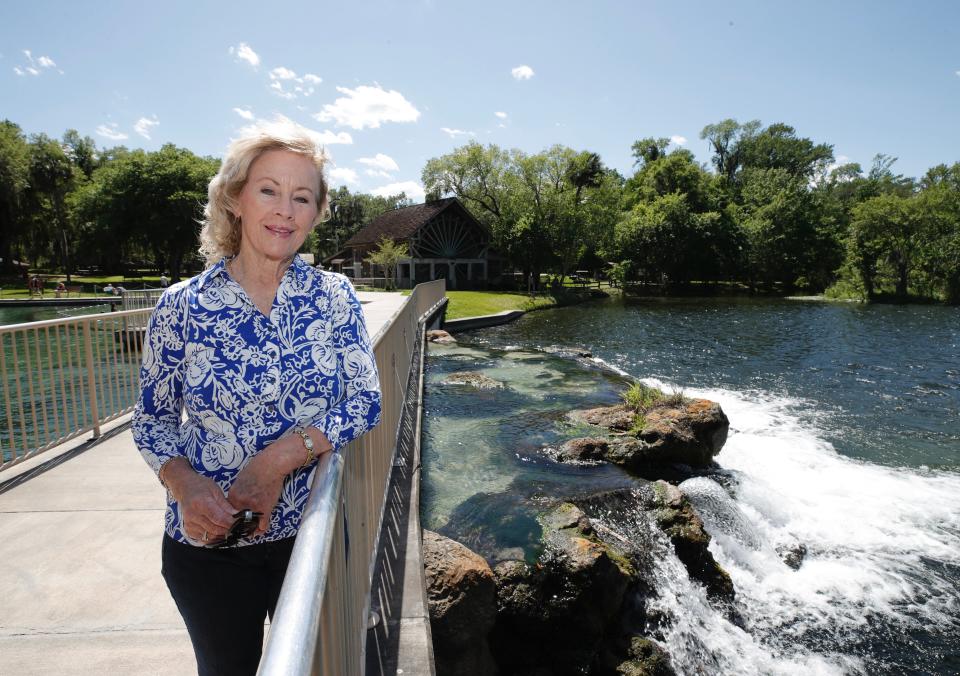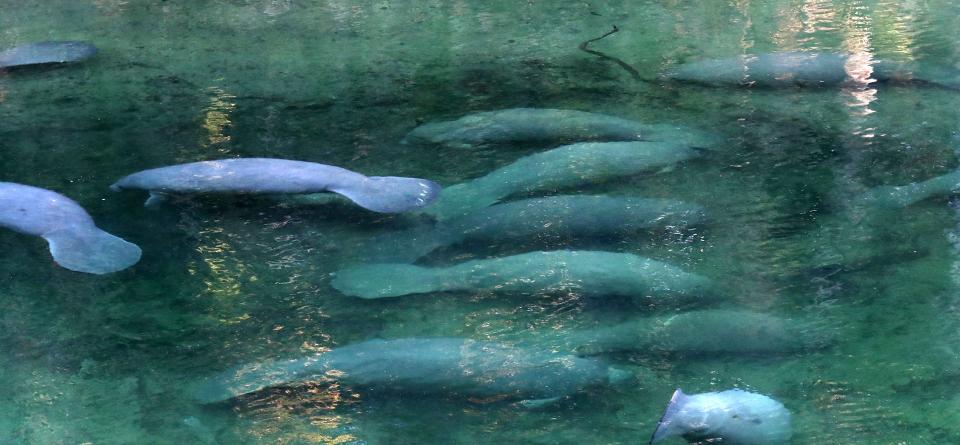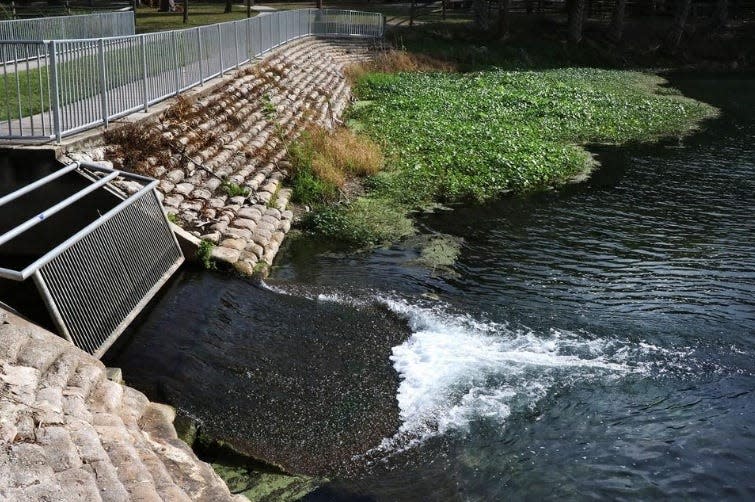DeLeon Springs' downtown corridor, McInnis Elementary School finally getting central water, sewer
DeLeon Springs resident Amy Munizzi likens her town to Cinderella. But up until very recently, it's been the down-on-her-luck, pre-fairy godmother Cinderella.
But this month the fairytale happy ending is starting to come into view for DeLeon Springs, and it about brings Munizzi to tears.
Munizzi, president of the nonprofit DeLeon Springs Community Association, Inc., shared her joy with association members and other stakeholders the day after the Volusia County Council approved four items, largely interconnected, that will bring central water and sewer lines to the U.S. Highway 17 corridor that runs through the center of town.
"Today is a day to celebrate a turn in the history of this community, back to the days when our downtown was inviting and quaint, and forward to the day when we shine again as the jewel of Volusia County that we all know DeLeon Springs to be!" Munizzi wrote in a March 16 email.
Erin Reed, utility engineer for Volusia County, in an interview last Friday said she can safely say construction on the 3-mile, $10.4 million pipeline project will start this summer.
The county is receiving grant funding to the tune of $6.4 million for the project. Barring any unforeseen issues, construction is expected to take 14 months.
Munizzi said utilities were starting to feel within reach 15 years ago, but the Great Recession struck them down before they could get started.
"Volusia County saw the writing on the wall," Munizzi said.
Critical connections
The project is a win for DeLeon Springs in multiple ways.
The utility lines, which will be constructed by Sanford-based Wharton-Smith, Inc., will run from Louise S. McInnis Elementary School, 5175 U.S. Highway 17, and connect to DeLand's water and wastewater system on County Road 15A.
The long-struggling wastewater treatment package plant that serves the school has, at times, failed to function properly. When this occurs, the district — and sometimes parents of the schoolchildren and others in the community — provide jugs of clean water for the approximately 400 students and 100 school staffers.
Principal Paul Struska said he's experienced this a handful of times in the nearly two years he's worked at McInnis.
"Having the project completed will give us that confidence that every day we come and we have the basic utility services that are necessary to run a school without any interruption to learning and teaching," Struska said by phone Monday.
Utility service also is expected to be a boon for businesses and other property owners that front U.S. 17.

Existing businesses will be able to do more with their property when septic systems, wells, drain fields and buried fire-suppression tanks are no longer factors, Munizzi said.
The availability of utilities also will make it easier for the development of new businesses as entrepreneurs in recent years have found trying to start a business in the community cost-prohibitive.
"If you’ve got to come up with $100,000 or so to upgrade the well and septic system and put in your own fire suppression tanks before you can even renovate the building, forget it," Munizzi said.
The DeLeon Springs Community Association president said she hopes the project will draw businesses that mesh well with ecotourism as the area is home to DeLeón Springs State Park and Lake Woodruff National Wildlife Refuge. Multiple trails also connect to the community.
While it's understood that some level of development may occur in the future, Munizzi told the Volusia County Council during the March 15 meeting that DeLeon Springs residents "don't want to be DeLand or Port Orange, beautiful as they are."
She expounded on the point in the email she sent the next day.
"Our greatest desire is that we retain our quaint, rural way of life and our agricultural heritage," Munizzi wrote. "Yet we can also profit from the increased revenues and jobs created by businesses that serve our needs and the need of our visitors."
She said the association already is working with Volusia County staffers on "protections for areas that are already zoned one-house-per-10-acres, and managed growth in the older sections that were already zoned for smaller lot subdivisions years ago."
Saving springs
The project is years in the making for DeLeon Springs and comes at a critical time as the community's namesake is in need of help.
"We have to stop doing business as usual," Mike Ulrich, water resources and utilities director for Volusia County, said in an interview last Friday. "We have to do other things, things that protect and preserve."
Remediation efforts are required by the state.
The Legislature in 2016 in its Florida Springs and Aquifer Protection Act identified 30 "Outstanding Florida Springs." Twenty-four of those springs, including DeLeon, Blue and Gemini Springs in Volusia County, were declared impaired by the levels of nitrate pollution.
As a result, municipalities across the state began developing basin management action plans, often called BMAPs, to clean up the springs.
Officials hope cleaning up the springs also will improve conditions for manatees, which died in record numbers last year.

Read: Florida Springs and Aquifer Protection Act
Gemini Springs: Plans to oust 2,300 septic tanks in DeBary include vacuum sewer system, no water lines
The area surrounding DeLeon Spring, unlike that of Gemini Spring and Blue Spring, remains fairly rural, Terri Lowery, senior vice president of Jones Edmunds, an engineering and consulting firm, told the County Council during its March 15 meeting.
In February 2020, representatives from Jones Edmunds and Volusia County met with a few dozen DeLeon Springs residents to talk about options.
"What we heard from your residents is at this point they prefer a decentralized alternative," Lowery said.
Unlike Gemini Spring where the biggest nitrogen contributors are urban turfgrass fertilizer and septic systems, DeLeon Springs' biggest nitrogen contributor is farm fertilizer.

However, state law restricts the degree to which counties and municipalities may regulate fertilizer use.
Septic systems account for an estimated 14% of the nitrogen load for DeLeon Spring, but 22% of that load is within the priority focus area, according to the BMAP.
Priority focus areas as "vulnerable areas where pollution sources pose the highest risk due to proximity to a spring and permeable [sandy] soil conditions," according to the Department of Environmental Protection. No new conventional septic systems are permitted on lots under 1 acre that are located in the designated priority focus areas.
There also are approximately 3,700 homes with septic systems in the priority focus area, Ulrich told the County Council.
Residents on such lots in the priority focus area will have to upgrade their system within the BMAP's 20-year timeframe, Ginger Adair, the county's environmental management director, told the council.
The DeLeon Spring Wastewater Treatment Feasibility Analysis Report, a $3.9 million budget resolution for the utility project and the contract with Wharton-Smith all received unanimous approval from the council.
The council also approved county staff's request to submit an application to the Department of Environmental Protection for a $1.1 million grant that would help cover up to $7,000 of the cost for residents who will need to upgrade their systems in accordance with the BMAP.
County Chair Jeff Brower cast the lone dissenting vote after expressing concerns about what could happen to residents in the aforementioned situation who are unable to afford the upgrade.
Councilwoman Heather Post said she doesn't like that some residents are stuck in this situation, but voting in support of applying for the grant is an acknowledgment that the council sees what's coming down from the state.
"I say we try and grab as much money as we can, at every angle, to put aside, because it’s inevitable and it’s happening," Post said during the meeting. "When it really comes down to it and it is mandatory and people are forced to do this, we need to help them."
County Manager George Recktenwald said if there is good news, it's that the need to clean up the springs isn't limited to Volusia County, so it's expected additional state programs will become available over time.
This article originally appeared on The Daytona Beach News-Journal: Central water, sewer finally coming to downtown DeLeon Springs, McInnis Elementary

